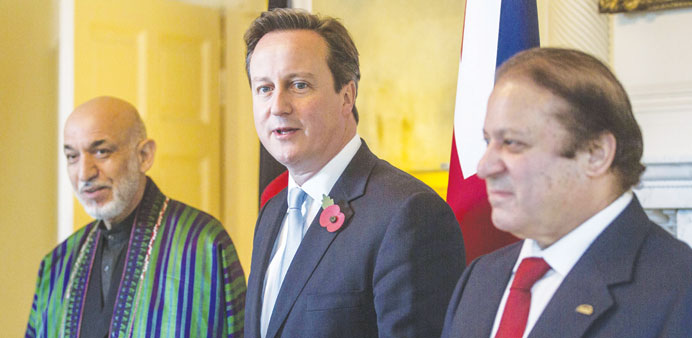British Prime Minister David Cameron, Afghan President Hamid Karzai and Pakistani Premier Nawaz Sharif pose for pictures ahead of a meeting in Downing Street in London on Tuesday. Karzai said in a statement that a deal had been reached after talks on Tuesday in London with Pakistani Prime Minister Nawaz Sharif.
Agencies/London
Afghan negotiators seeking peace with the Taliban will soon travel to Pakistan for their first meeting with key militant commander Mullah Baradar, officials said yesterday.
Afghan President Hamid Karzai said in a statement that a deal had been reached after talks on Tuesday in London with Pakistani Prime Minister Nawaz Sharif.
Baradar was freed from jail in Pakistan in September as part of efforts to kickstart Afghanistan’s peace process, but since his “release” it appears he has been kept under house arrest by the Pakistanis.
“It was agreed on that a High Peace Council delegation will visit Pakistan and meet with Mullah Baradar in the near future,” the statement from Karzai’s office said.
The High Peace Council is the Afghan body charged with opening negotiations with the Taliban insurgents as US-led Nato forces prepare to withdraw from the country by the end of next year.
Support from Pakistan, which backed Afghanistan’s 1996-2001 Taliban regime, is seen as crucial to peace after Nato troops depart — but relations between the neighbours remain uneasy.
The Pakistani government insists Baradar, once the number two to Taliban supremo Mullah Omar, has been released and is free to meet anyone to further the peace process.
But the Taliban complain he is effectively still behind bars and Pakistani security officials last month said he was being held at a safe house in Karachi.
Afghan officials believe that Baradar could encourage Taliban leaders to seek a negotiated settlement to end the 12-year insurgency if he were fully at liberty.
A Taliban office in Qatar that opened in June was meant to lead to talks, but instead it enraged Karzai after it was styled as an embassy for a government-in-exile.
Karzai and Sharif met in London with British Prime Minister David Cameron in the fourth of a series of trilateral meetings designed to foster stability in the volatile south Asia region.
The meeting was considerably more low-key than one hosted by Cameron at his official country retreat in February, which ended with grand promises of a peace deal within six months.
Karzai’s statement said that Sharif had agreed to make his first visit to Kabul soon since coming to power after May’s general election, but there was no immediate confirmation from the Pakistani side.
Meanwhile a Western official said yesterday, confirming some details in a New York Times report that the US apprehension of a Pakistani Taliban commander last month came during a failed attempt by Afghan officials to form an alliance with his militant group.
The US this month confirmed the arrest of Latif Mehsud, a trusted deputy to Pakistani Taliban leader Hakimullah Mehsud, during a military operation that heightened tensions with the Western-backed government of Afghan President Hamid Karzai.
The Times reported on Tuesday that the US staged the operation to seize Mehsud after being tipped off about the plan by Afghan intelligence officials to try to work with the Pakistani Taliban and later use that as leverage against Pakistan.
It quoted two Afghan officials saying that they had struck a tentative deal with Mehsud: Afghanistan would not harass Pakistani Taliban fighters along the border if they did not attack Afghan forces.
“Publicly, the Afghan government has described Mr Mehsud as an insurgent peace emissary. But according to Afghan officials, the ultimate plan was to take revenge against the Pakistani military,” the Times wrote.
The Afghan embassy in Washington declined comment.
The Afghan government and the US accuse Pakistani intelligence services of ties to militant groups fighting across the border in Afghanistan.
Asked about the Times report, a Western official, speaking on condition of anonymity, broadly confirmed Afghan efforts to form an alliance with the group but did not provide further details.
Karzai called the US capture a violation of Afghan sovereignty and public disclosure of the incident comes as Afghanistan considers whether to approve a security pact with the US to keep US troops in the country once Nato wraps up its combat mission at the end of 2014.
The Pakistani Taliban, or Tehreek-e-Taliban, is believed to have trained Pakistani-American Faisal Shahzad in bomb-making techniques and funded his plot to detonate a car bomb in New York’s Times Square in 2010.
The device failed to explode and was defused by a bomb squad. The TTP seeks to topple Pakistan’s government.

